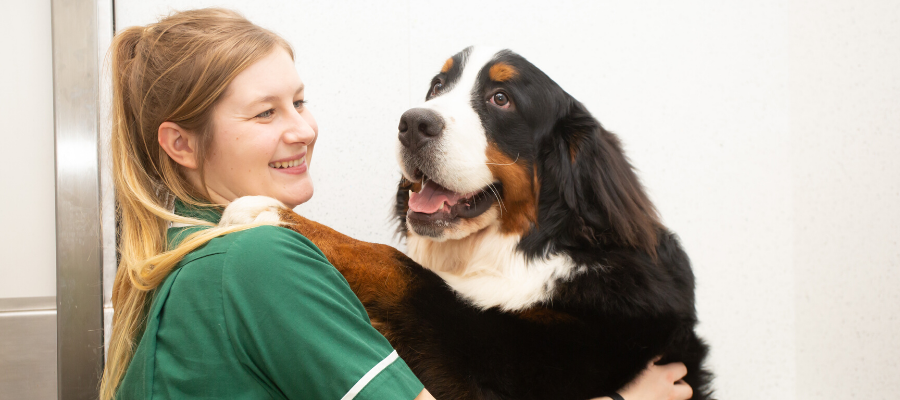
The pancreas is a small organ that sits next to the stomach. It produces enzymes to help digestion; when these enzymes become activated too early (within the pancreas rather than in the small intestine) they can begin to digest the pancreas, leading to inflammation known as ‘pancreatitis’.
Pancreatitis can appear as an ‘acute’ attack, in which symptoms come on suddenly or as a chronic condition which develops slowly over time. Repeated acute pancreatitis can result in chronic pancreatitis. Both forms can vary in severity from mild to life-threatening.
What are the signs of pancreatitis?
- Repeated vomiting
- Diarrhoea (possibly haemorrhagic)
- Appetite loss
- Lethargy
- Weight loss
- Fever
- Dehydration
- Abdominal pain – dogs may adopt the ‘prayer position’ with their head and front legs towards the floor and their rear in the air.
Chronic pancreatitis may show no obvious symptoms at all but you may notice lethargy, decreased appetite and weight loss.
What causes pancreatitis?
The cause of pancreatitis is as yet unknown, however certain factors can increase the likelihood of pancreatitis occurring, these include:
- Obesity
- A recent high-fat meal or a generally high fat diet
- Diabetes
- Hypothyroidism
- An adverse reaction to medication
- A reaction to a toxin
- Recent surgery
- Blunt force trauma
- Certain cancers
Some breeds have been shown to have a higher incidence of pancreatitis, such as:
- Miniature Schnauzers
- Boxers
- Border Collies
- Cavalier King Charles Spaniel
- Cocker Spaniels
- Small terrier breeds
How is pancreatitis diagnosed?
Your vet will perform a full physical examination, in severe cases your pet may need to be hospitalised for symptomatic treatment whilst a diagnosis is reached. A blood test can be performed to measure pancreatic enzyme levels if pancreatitis is suspected. Your vet may also perform radiographs to rule out other causes of symptoms (such as foreign body ingestion). An ultrasound can provide a clear diagnosis of pancreatic abnormality, particularly in acute or severe cases.
How is pancreatitis treated?
Pancreatitis is often treated symptomatically whilst the inflammation of the pancreas subsides. In severe cases your dog may need to be hospitalised for fluid therapy, pain management and observation. A bland, low fat diet is recommended during recovery and ongoing for those with chronic pancreatitis.
What is the prognosis for dogs with pancreatitis?
Most dogs will make a full recovery with no long term ill-effects. In severe or repeated cases, exocrine pancreatic insufficiency (EPI) or diabetes mellitus can develop. Owners should be aware of the early signs of pancreatitis, particularly in dogs who are pre-disposed or have suffered previously, as early treatment will lead to a more positive outcome.
Call us on 01435 864422 if you are concerned your dog may be showing signs of pancreatitis.

